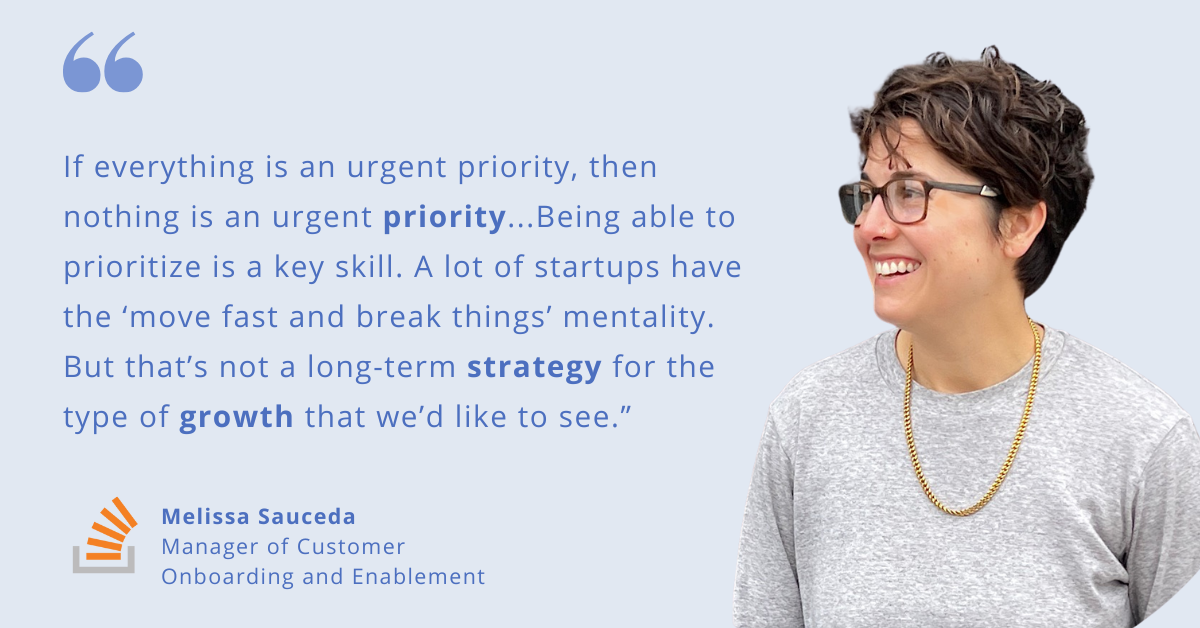Melissa Sauceda isn’t at all worried about robots coming for her job.
“I tell my team that all the time,” says the Manager of Customer Implementation and Enablement at knowledge sharing platform Stack Overflow. “Stack could easily bring on robots to onboard customers, but we know that it’s our consultative presence in the customer partnership that is one of the biggest value-adds, and why folks choose us.”
That’s because working productively with others is as much of an art as it is a science, explains Melissa, who knows something about the mix of both. A former sociology student, Melissa is fascinated by looking into human behavior with an analytical approach.
In a way, her career has been all about using technology to facilitate human experience and learning, first as an administrator in higher education, and now as a manager in tech. Within Stack’s collaborative, non-hierarchical structure, Melissa has found that true productivity comes from empowering individuals through communication, iteration, and open-mindedness.
And those are three qualities that she and her (very human) teammates have in spades.
“Stack Overflow is easily the most collaborative environment in which I’ve ever worked, including in institutions of higher learning,” she says. “I’m learning a lot about operationalizing and making work more efficient, but still delivering best-in-class customer service.”
We sat down with Melissa to talk about some of those learnings, including what advice she’d give to other managers and leaders looking to unlock their team’s productivity.
The Human Side of Tech
Melissa got into tech after using an AI tool to help predict upcoming enrollment numbers at her employer, the University of San Francisco. The predictive insight was so helpful, and she was so convinced by it, that she ended up getting a job offer from the company that made the tool — and accepted it.
The timing was right. Melissa comes from a family of educators, but she was beginning to have trouble reconciling her belief in the importance of education with the life-changing debt that many students had to take on. And after working through the pandemic at a job that was stable yet stagnant, the chance to move to Stack Overflow was one Melissa was ready to jump on.
“I had been on autopilot for a few years, and the lack of stimulation was becoming unhealthy and really unsatisfying,” she says. “I knew I was going to have an opportunity to build, create, and iterate at Stack Overflow, and that’s definitely been true for the nearly 18 months I’ve worked here.”
Since her role is all about setting customers up to be successful, it’s almost like Melissa has come full circle.
“Our team’s job is to teach users and customers to use Stack Overflow for Teams. We get to play around with different learning modalities and pedagogies,” she says.
And this time, she fully believes in the product that goes with it.
“We tell a very compelling story: when knowledge is moderated to ensure that there's no misinformation, and objective in nature, it can be a very, very powerful utility. It’s not lost on me that I’m proud to work at Stack Overflow because of its products.”
Embracing Learning for All
At the end of last year, Melissa’s team had four dedicated implementation managers.
Now they have 12.
Every hire shares at least one piece of criteria: Melissa knows she’ll be able to learn something from them.
“We don’t extend offers to folks that we don’t think are going to be able to teach us stuff,” she says. “We’re very earnest learners, and it’s really inspiring to get to learn from these folks every day.”
Melissa individually, and Stack as a company, support and enable that learning. A standard agenda item on Melissa’s 1:1s with her team is their own personal development goals and how she can support them. “Part of my responsibility is to make you successful for whatever comes next for you,” she says.
And company-wide, Stack fosters a culture of curiosity, learning, and growth in part through supporting employees in their academic and career aspirations. One of Melissa’s team members is pursuing an MBA, for instance, while another is active in several professional associations.
And Melissa sees that the focus on learning and teaching isn’t just aligned with Stack’s source code and product — it also actively contributes to a sense of shared and sustainable productivity.
5 Ways to Support Your Team’s Productivity
As her team has grown, Melissa has leaned on things both high-level (like the principles of change management) and tactical (like meeting maintenance) to streamline productivity while supporting her team. Here are her top tips for doing the same:
- Avoid meeting fatigue. Melissa and her team spend 90 minutes a week together: 30 minutes in a team meeting, focused on process changes or announcements, and 60 minutes in an account review to share “war stories and challenges.” She separately meets with each 1:1, and occasionally in different small groups depending on project needs. “We have that time together each week, but we’re also great async communicators,” explains Melissa.
- Stay open to new ideas. When it comes to how to support customers, “we have a formula and a recipe,” says Melissa. “But we pressure-test that and adjust as needed. Nothing is set in stone, which is another reason why it’s important for us to bring in folks who we can learn from, because their experiences help make our shop more efficient.”
- Don’t make everything a fire drill. “If everything is an urgent priority, then nothing is an urgent priority,” she says. “Going back to the humans over machines philosophy, being able to prioritize is a key skill. A lot of startups have the ‘move fast and break things’ mentality. But without judgment and discretion, that mentality isn’t a long-term strategy for what we’re trying to accomplish.”
- Surround yourself with people you can learn from. “It’s okay to be the smartest person in the room, but you should be recruiting and surrounding yourself with people from whom you can learn, whether that’s people you manage, your peers, or other teams,” says Melissa.
- Plan ahead for challenges. “Good leaders know that bad storms are going to come. If you’re prioritizing thoughtfully and being proactive when you’re not in those urgent moments, then you’re going to weather that storm.”
To learn more about Stack Overflow, including their open roles, click here!




